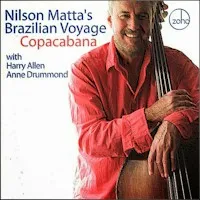Styles: Saxophone Jazz
Year: 2007
File: MP3@320K/s
Time: 58:55
Size: 135,3 MB
Art: Front
(7:30) 1. Felicidade
(5:56) 2. Gentle Rain
(4:11) 3. Choro
(5:59) 4. Pra Dizer Adeus
(5:50) 5. Alone
(6:10) 6. A Noite do Meu Bem (Night of My Beloved)
(5:48) 7. Falando de Amor
(6:06) 8. Ballad for Lana
(5:35) 9. The Shadow of Your Smile
(5:50) 10. Fotografia
Night of My Beloved
Year: 2007
File: MP3@320K/s
Time: 58:55
Size: 135,3 MB
Art: Front
(7:30) 1. Felicidade
(5:56) 2. Gentle Rain
(4:11) 3. Choro
(5:59) 4. Pra Dizer Adeus
(5:50) 5. Alone
(6:10) 6. A Noite do Meu Bem (Night of My Beloved)
(5:48) 7. Falando de Amor
(6:06) 8. Ballad for Lana
(5:35) 9. The Shadow of Your Smile
(5:50) 10. Fotografia
George Garzone is a marvelous tenor saxophonist who is also known as a highly regarded educator. Some of people he has taught includes Branford Marsalis, Mark Turner, Joshua Redman, and many more. Garzone's debut album arrived fairly late in 1995 with the main influences coming from Stan Getz and John Coltrane. For this exceptional release, Garzone tapped into his love of Getz as he was paired with Trio da Paz, a superlative Brazillian trio led by the prominent guitarist, Romero Lubambo. In addition, piano expert Kenny Werner also joins this outstanding group of musicians. The casual listener might mistake this album as background music but that would be wrong. A sharp listener will pick up and savor the music being played by these masters. Each musician is tuned in to each other and aware of the right moment to play each note. This is an album that rewards deep listening.
Personnel: George Garzone (tenor sax); Kenny Werner (piano); Romero Lubambo (guitar); Nilson Matta (bass); Duduka Da Fonseca (drums).
Personnel: George Garzone (tenor sax); Kenny Werner (piano); Romero Lubambo (guitar); Nilson Matta (bass); Duduka Da Fonseca (drums).
Night of My Beloved







